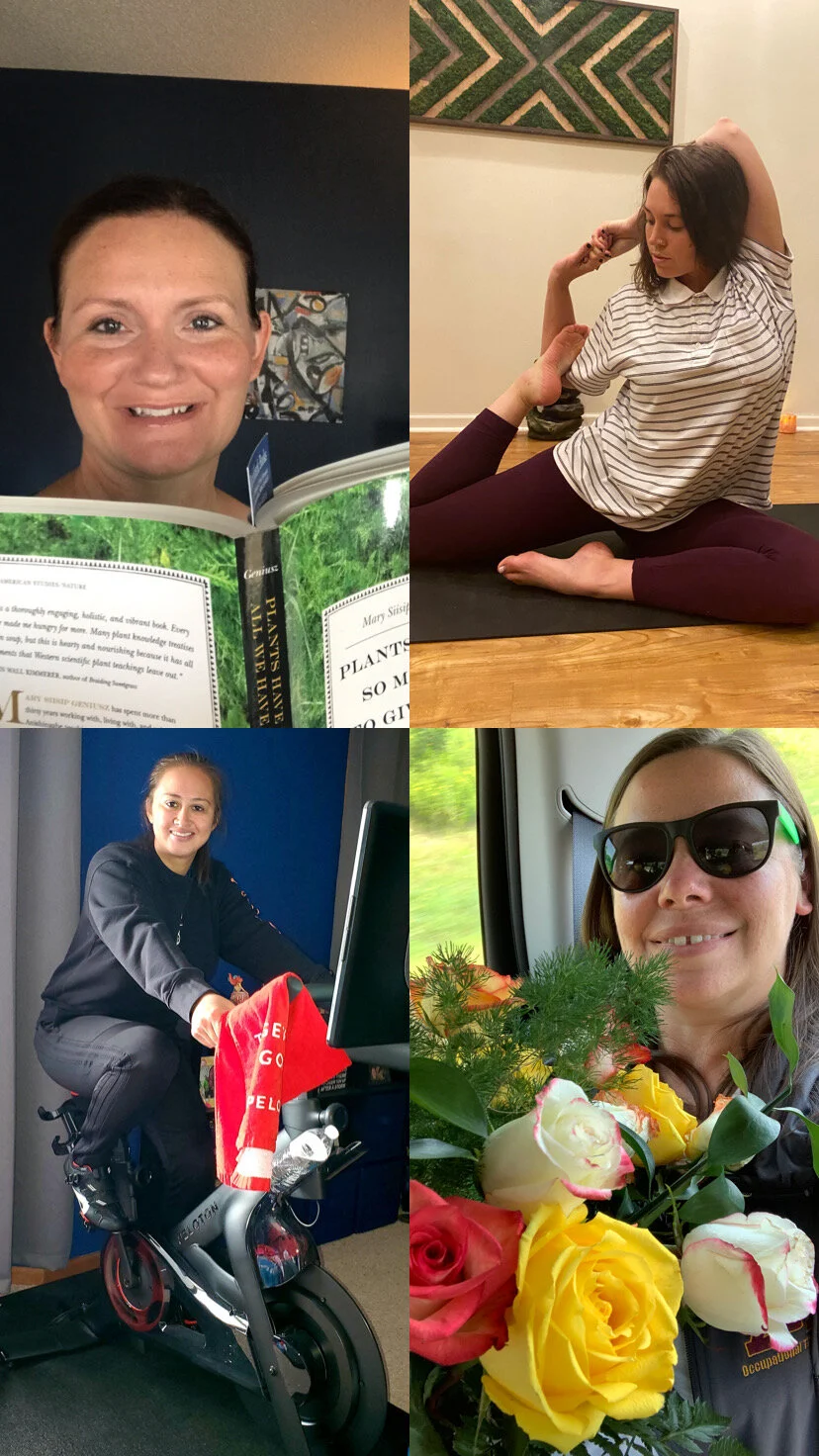Understanding what OT Means by Occupation: It’s life expanding
Today’s blog post is authored by: Kary Gillenwaters, OTR/L, (top left- reading), Marcie Israelson, OTD student, (top right- yoga) Christy Witkowski, OTA Graduate (bottom left-cycling) and Kim Frederickson, OTD student (bottom right- gardening). All are engaged in a favorite occupation.
Typical occupation definition
If you look up the word occupation in the Merriam-Webster dictionary you’ll find several different meanings. The first definition is “a: an activity in which one engages and b: the principal business of one’s life” (Merriam-Webster, n.d.). The second definition is a: the possession, use, or settlement of land and b: the holding of an office or position (Merriam-Webster, n.d.).
Occupational therapy definition
So what do we mean by occupation in occupational therapy, you ask? First, you are correct-- occupation does mean a job or work, but in occupational therapy it is so much more. “In occupational therapy, occupations refer to the everyday activities that people do as individuals, in families or other groups, and with communities to occupy time and bring meaning and purpose to life. Occupations include things people need to, want to and are expected to do” (WFOT, 2012a, para. 2).
You can see, a job or work is just one of many occupations you may have. If you’re wondering what kinds of questions occupational therapists (OT) focus on, we are looking at the why, what, where, when, how, and with whom of occupations and how they allow us to fully live. OTs recognize there are many factors that make any given occupation different for individuals, groups, or communities. We’ll take a look through each of those categories on today’s post.
Occupations through the lens of individuals, families/groups, and communities
Individuals
Let’s look at how the same occupation differs by person. For example, riding a bike is an activity that we may imagine in our heads to look similar. However, occupations are unique/special to each person, the time, and context. An occupational therapist considers the person’s unique characteristics, purpose for activity, energy level, location and safety of environment, experience with riding a bike, equipment they have accessible and how these conditions can vary at different times of the day. These are just a handful of factors that can influence how an individual participates in riding a bike.
To an occupational therapist, occupation is the work of everyday living. So when we understand that our individual, daily occupations serve our values and needs, we can learn how occupations influence our health and wellbeing.
Above we looked at this from an individual perspective, with the leisure or community mobility occupation of riding a bike. Now we’ll look at how occupations affect families and communities.
Families
People have many roles in their lives. Consider a woman who is a sister, single mother, homeowner, and full time employee/supervisor/executive. Cooking is her jam-- it is something she needs to do for herself and family and something she enjoys for herself and for others. Family is very important to her and has resulted in a move across the country to be closer to more family. Recently, she was diagnosed with RA and so she is paying attention to the ways this impacts her everyday living with the help of an OT. This mother has individual occupational needs and the occupational needs of the family unit. The shift in roles combine with values and occupations the family needs and wants to do to determine how they occupy their time. Depending on what is happening at any particular season in a family’s life-- such roles and values influence the when, why, with whom, where, and how they do activities. Occupational therapists look at how the family or any group can function as they adapt to changes in circumstances that influence function.
Community
Communities also have the chance to notice what they need as a whole, for inhabitants to be well, thrive, and belong.
You may be thinking of several possibilities in your own communities, here’s one such example:
A local Insurance company partnered with the city they are based in to clean up, make a local park more inviting, and sponsor the construction of a new pavilion. They recognized the need for avoiding layoffs, as well a need to widen the paths and create outdoor spaces where people could safely gather and be active during a pandemic. This partnership allowed their golf course grounds crew to work and avoid layoffs during a global pandemic. In addition, more people had access to nature and occupations that promote physical activity and connection with others.
So there you have it-- an introduction to what occupational therapy means by occupation. With this new definition in mind, what affects your participation in the things you need, want, or are expected to do? What everyday activities give your day meaning and purpose?
References
Merriam-Webster. (n.d.). Occupation. In Merriam-Webster.com dictionary. Retrieved June 30, 2021, from https://www.merriam-webster.com/dictionary/occupation
World Federation of Occupational Therapists. (2012a). About occupational therapy. Retrieved from https://www.wfot.org/about-occupational-therapy

